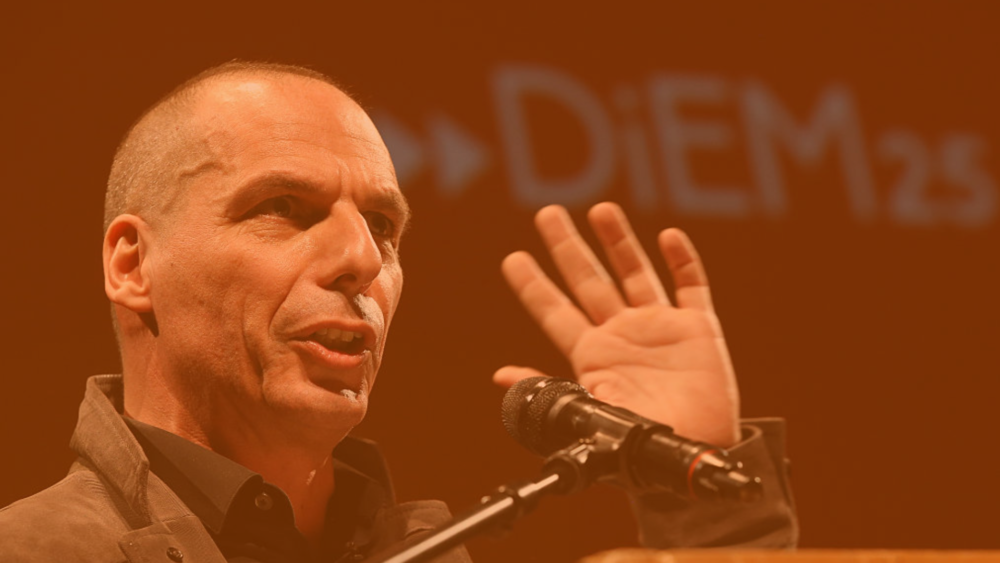Yanis Varoufakis dives into the key global trends and challenges shaping 2025. From the return of Trump to the shifting power of the US dollar and China’s influence, he breaks down what these developments mean for the world economy and politics.
The year 2025 finds us standing at a decisive crossroads, where the consequences of decades-long neoliberal policies are colliding with the realities of a shifting global economic order. The interplay between Donald Trump, the American dollar, and China serves as a microcosm of the systemic contradictions plaguing global capitalism.
The dollar’s dilemma: A system at war with itself
Donald Trump, the figurehead of a crumbling economic orthodoxy, confronts a paradox emblematic of the broader American predicament: the simultaneous desire to revive domestic manufacturing while clinging to the dollar’s global supremacy. The irony is clear. A weaker dollar might boost exports, but the economic establishment – of which Trump is both a critic and a beneficiary – refuses to relinquish its grip on the “exorbitant privilege” the dollar affords. This duality reveals not only a policy contradiction but also the unsustainable foundation of the U.S. economy: a system addicted to external debt, cheap imports, and financial speculation.
Trump’s fixation on tariffs illustrates the futility of nationalist trade policies in an interconnected world. Rather than addressing structural flaws in the American economy – its overreliance on finance and hollowed-out industrial base – these measures risk fueling global instability. Ironically, such instability often leads to a surge in dollar demand, undermining the very goals Trump seeks to achieve. The dollar strengthens, the trade deficit persists, and the American working class continues to bear the brunt.
Tax cuts and the mirage of growth
Adding fuel to the fire are Trump’s tax cuts, a textbook example of trickle-down economics dressed in populist rhetoric. These policies, aimed at enriching corporations and the wealthy, exacerbate inequality while inflating the dollar through foreign capital inflows. For ordinary Americans, this means stagnating wages, rising costs, and a system increasingly skewed toward rent-seeking elites.
The U.S. economy’s addiction to the dollar’s global role – the “exorbitant privilege” – mirrors the broader failures of neoliberalism. This privilege allows the U.S. to run perpetual deficits, but at the cost of deepening economic inequality and perpetuating global imbalances. And yet, any suggestion of abandoning this unsustainable privilege is politically toxic, as it threatens the interests of financial elites who profit from the status quo.
The illusion of a new Plaza Accords
Some have suggested that Trump’s tariffs might be part of a larger strategy: to negotiate currency devaluation agreements with rivals like China or the EU, akin to the Plaza Accords of the 1980s. But the world of 2025 is not the world of 1985. China is not Japan, and its economy is not subservient to U.S. interests. The very notion of coercing Beijing into revaluing the yuan reflects a delusion rooted in imperial hubris – a refusal to recognise the multipolar reality of today’s global economy.
Rather than pursuing meaningful reforms to global trade and finance, Trump’s policies reinforce a failed system that prioritises short-term gains for the few over long-term stability for the many.
The real question: China and the path to transformation
The real pivot of the global economy lies not in Washington’s hollow rhetoric, but in Beijing’s strategic decisions. As the U.S. grapples with its contradictions, China faces a choice: Will it remain a passive participant in a dollar-dominated system, or will it take bold steps to reshape the global economic order?
One possibility is the transformation of the BRICS bloc into a counterweight to the IMF-World Bank nexus, with the yuan serving as a cornerstone of a new Bretton Woods-like system. Such a move could mark the beginning of the end for dollar hegemony, creating a more multipolar framework for global trade and finance. Yet this would require China to fully embrace the risks and responsibilities of leadership in a world yearning for systemic change.
Toward a post-capitalist future
2025 is not just another year of economic uncertainty; it is a moment of reckoning. The contradictions of the dollar-centered global economy, the environmental and social toll of unchecked capitalism, and the growing discontent among ordinary people demand bold, systemic alternatives.
The choice before us is not merely between a strong or weak dollar, between Trump’s tariffs or China’s strategic patience. It is a choice between continuing down the path of inequality, instability, and ecological destruction – or forging a new economic paradigm that prioritises democracy, fairness, and sustainability.
The world cannot wait for China, Trump, or any single actor to lead the way. The time has come for international solidarity, for movements like DiEM25 to articulate a vision of a post-capitalist future that transcends the narrow confines of national interest. The crossroads of 2025 is not just an economic moment – it is a call to action.
Do you want to be informed of DiEM25's actions? Sign up here















